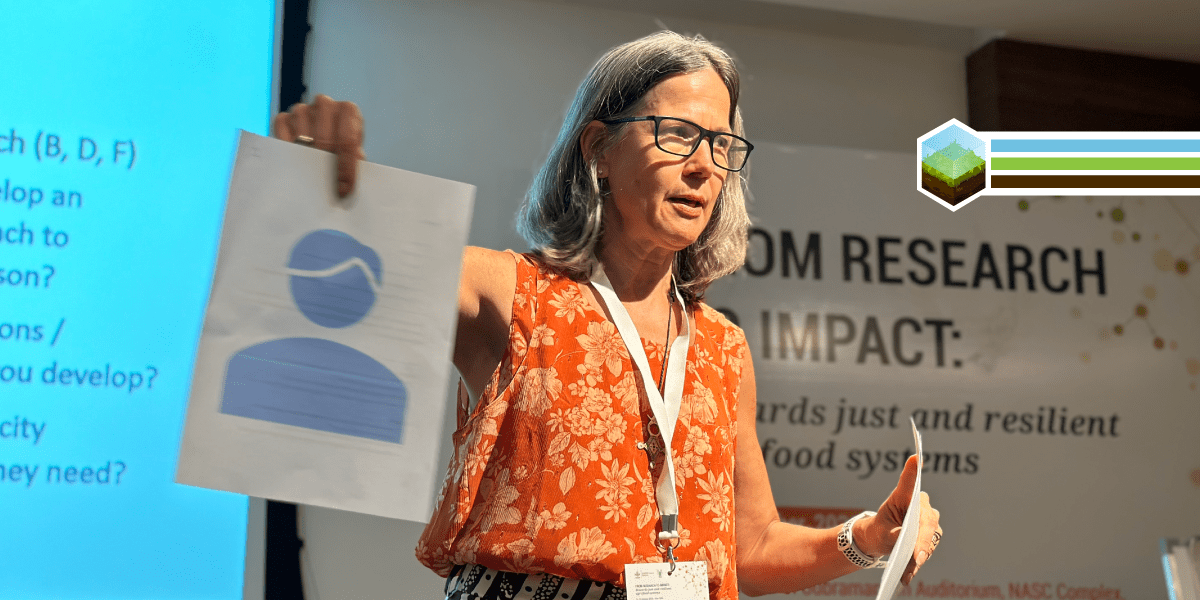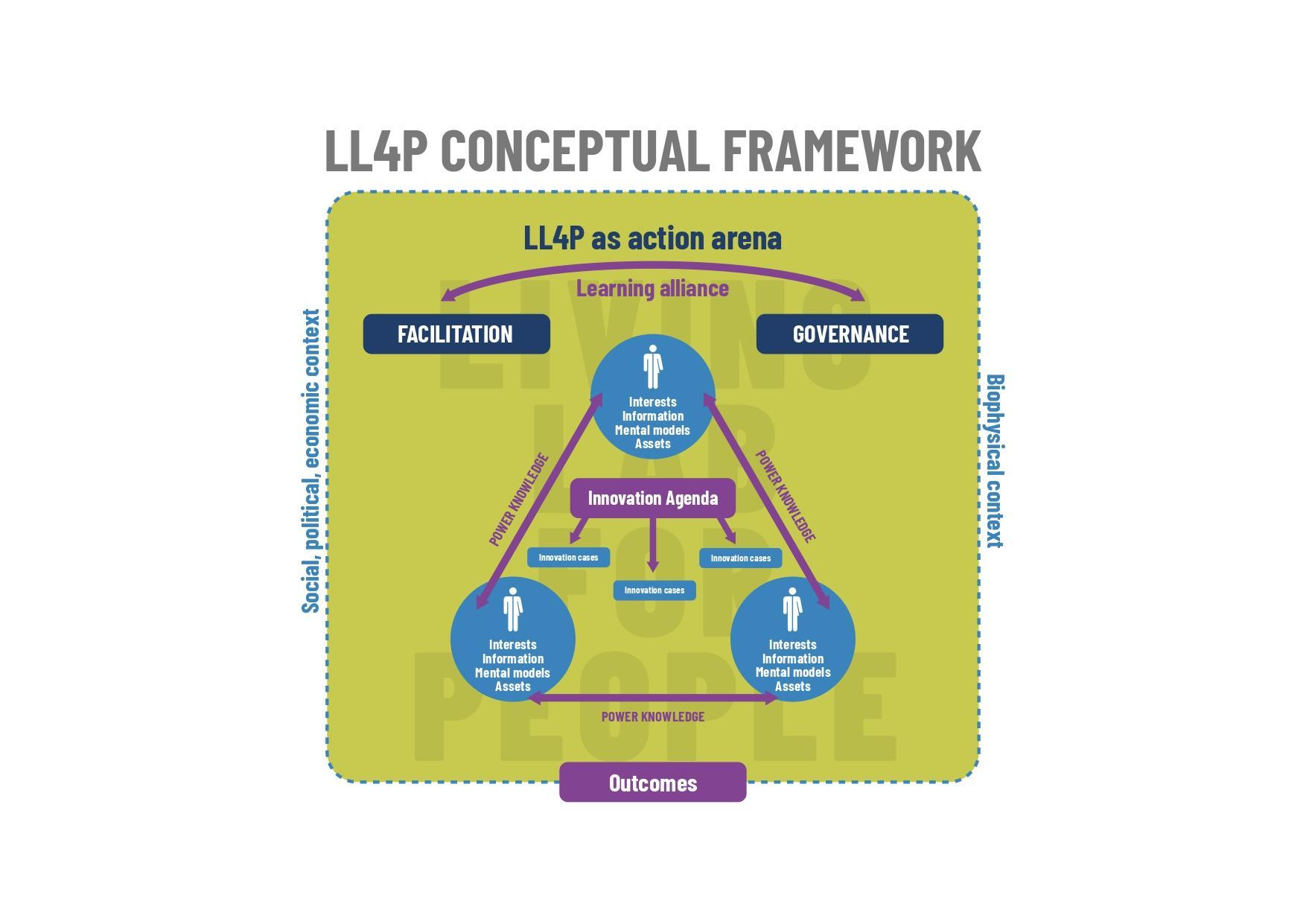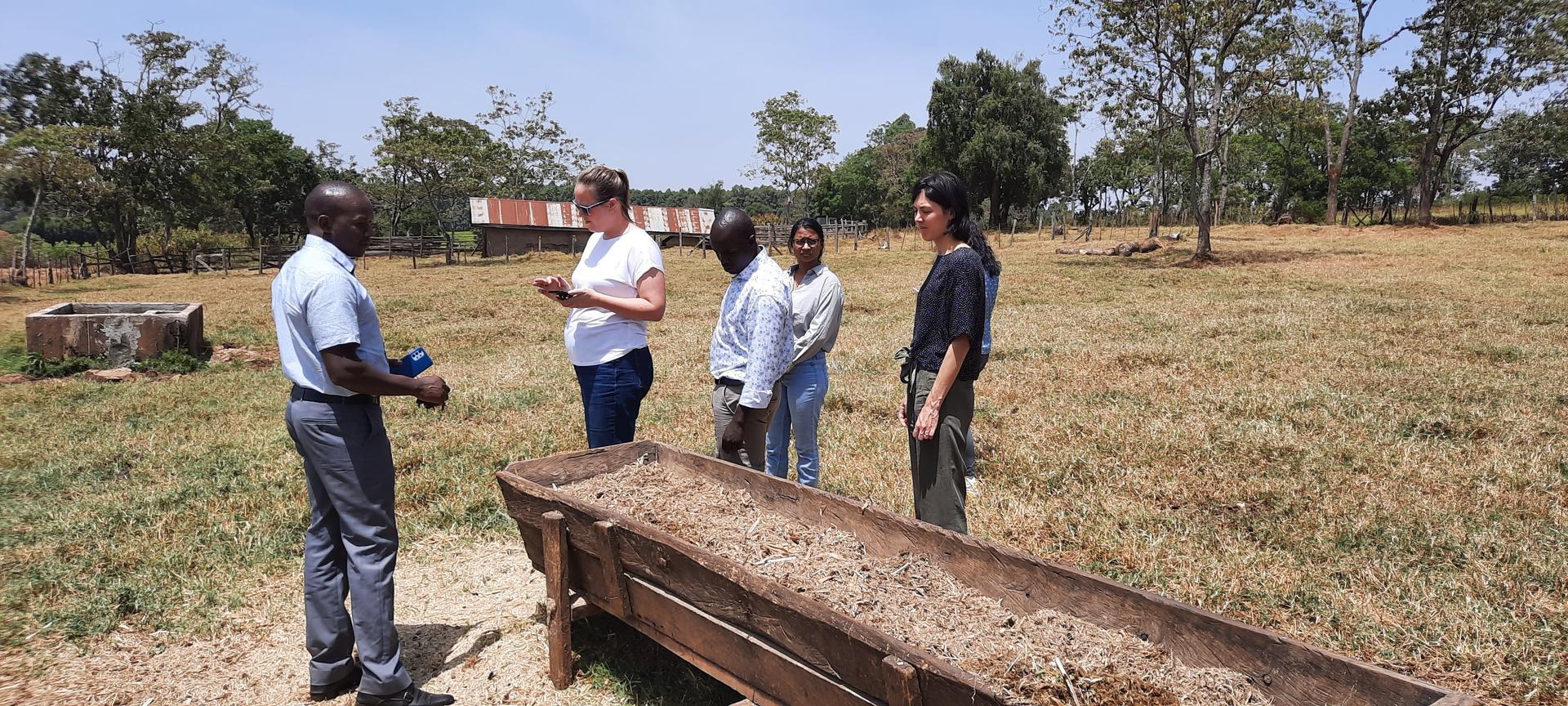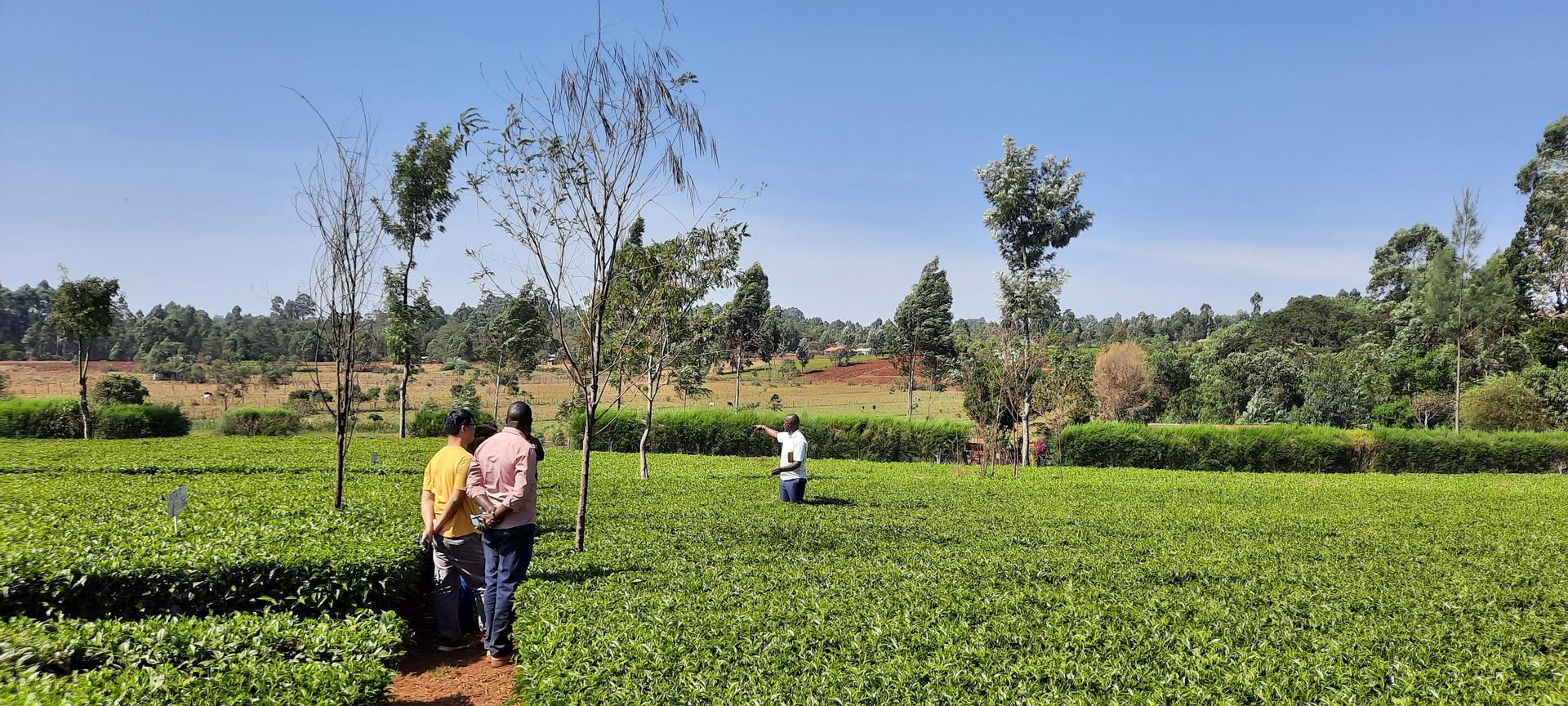Blog Accelerating Gender-transformative Approaches in Agri-food Systems Development

Reporting from Delhi, CGIAR–ICAR GENDER Conference 2023: We speak with researchers examining gender dynamics and disparities widespread across agri-food systems. Through participatory and gender-transformative approaches, researchers could accelerate meaningful impact on the ground.
From being drivers of accelerated change to embracing the empowerment that such change entails, people are inarguably central in every development initiative. But more than halfway to the 2030 Agenda, recent evidence shows the world is lagging in its goal to achieve gender equality, displacing women to further disadvantage amid persistent and interlinked health, climate and humanitarian global crises.
To contribute to redressing these inequalities, over 20 researchers from the Alliance of Bioversity International and CIAT participated at this year’s international CGIAR GENDER Conference, From Research to Impact: Toward Just and Resilient Agri-Food Systems.
Consistent with the Alliance’s commitment to tackling inequality and social exclusion with a more intersectional approach (i.e., how gender issues are embedded across agriculture, nutrition and environment landscapes), researchers shared their research across conference themes on gender-responsive innovations, women’s empowerment and gender-transformative change, and equitable market systems—among other themes.
Alliance Director General Juan Lucas Restrepo said:
Eliminating gender inequalities and advancing social inclusion in agriculture and food systems is at the core of our work at the Alliance. By participating in this year’s CGIAR GENDER Conference, hosted in partnership with the Indian Council of Agricultural Research (ICAR), our researchers had the chance to participate in thought-provoking discussions and interact and exchange with others on how to further expand CGIAR’s work to achieve gender-equitable, socially inclusive food systems and landscapes that sustain the planet, drive prosperity and nourish people.
Taking participatory, gender-transformative approaches forward
The Alliance’s extensive gender research has been supporting progress on meeting targets and monitoring progress toward gender equality, says Marlène Elias, Alliances Module Leader for the CGIAR GENDER Impact Platform and Gender Research Coordinator for the Alliance.
Our contributions range from developing methodologies that challenge discriminatory gender norms that limit women’s benefits or voice in agri-food systems, to having methodologies that track progress towards achievement of SDG 5 [Achieve gender equality and empower all women and girls].
Within CGIAR’s Low-Emission Food Systems Initiative (Mitigate+), researchers employed the framework of Living Labs for People (LL4P), a participatory approach in a specific place for stakeholders to all together “design, test, demonstrate and advance their sociotechnical innovations and associated modes of governance within a facilitated organizational structure.”

Living Labs put the project’s target “users” at the center of the research. In this case, Mitigate+ researchers will combine this approach of co-creation with a gender-transformative approach, collaborating with various public actors (government), private sectors, and experts (knowledge institutes). They want to collectively understand and accurately find ways to integrate low-emission objectives with the locals’ identified needs—ensuring benefits reach the target stakeholders in the context of their real-life, everyday environments.
This process, which entails holding a series of discussions among different groups, helps promote gender-equitable development and ensure social inclusion in the Living Labs.
For associate scientist Anne Rietveld integrating LL4P with a gender-transformative approach is important because the Living Lab approach does not automatically benefit marginalized people and communities or directly contribute to gender equality or women’s empowerment.
She further underscored the need to deliberately incorporate gender equality and social inclusion considerations in every research endeavor, saying: “I really think we should be pushing for this, because you can easily do a Living Lab without giving any attention to gender and social inclusion—but I don’t think we should!”
Anne explained that buy-in from colleagues and from other LL4P stakeholders, coupled with a with a gender-transformative approach, is essential for the success of the Living Labs. “We will have to build reflection and awareness raising on inequalities, into our stakeholder engagement processes.”
Knowledge and understanding of power relations, gender norms and gender dynamics in the LL4P sites are important in this respect as well.
Living Labs in action: Kenya
In Nandi County, Kenya, the Alliance led the initiation of a Living Lab while implementing several studies to understand how existing power relations or politics directly or indirectly affect women farmers’ access to innovations and other opportunities related to their work.
For instance, using new technologies that reduce the emissions from dairy cattle are not always taken up—and researchers have found that there is a difference between men and women in adopting such innovations. But a general situational analysis explains a part of why that is the case, and can help people in the future who are encouraging new technology take-up.
As such, results like this need to be included in stakeholder discussions and feed into processes to co-create these low-emission innovations.
Rietveld and colleagues will also study the LL4P approach and its potential to contribute to gender equality and social inclusion itself. This will be supported by a top-up grant which was awarded to the initiative by the GENDER Impact Platform.
The grant allows Mitigate+ researchers to further explore what barriers need to be addressed that perpetuate gender inequality in agriculture, particularly in low-emissions development, using the context-based framework of the LL4P approach.

Mitigate+ team in Nandi County, Kenya. Photo by: Birgit Habermann/ILRI.

Site visits with LL4P stakeholders in Nandi County, Kenya. Photo by: Birgit Habermann/ILRI.
The Asian context: ethnic minorities in Vietnam
“A lot of things still need to be done; understanding how the researcher can facilitate the engagement of stakeholders is such a big issue,” said researcher Lan Nguyen, a PhD student at Wageningen University & Research. “If you invite stakeholders, we need to consider how to make sure that everyone has a say, everyone has equal contribution, and how to reach an agreement.”
Nguyen’s previous work with the Alliance examined empowerment of ethnic minorities in Northern Vietnam. While both men and women experienced disempowerment, data revealed that women from ethnic minorities were overwhelmingly disenfranchised compared to their male counterparts due to the patriarchal culture.
In Nguyen’s study, the Alliance and local women’s union provided women with nutrition and agriculture training, as well as seeds for vegetables and legumes. Although the researcher worked with the locals prior to the training and seeds distribution, she said that co-designing tools and approaches would be a better way.
For Nguyen, learning about the LL4P provides her an avenue to reflect about what she could do better in her future research—noting how often researchers forget that, at the community level, people use their own agency to think of solutions. According to Nguyen:
“Co-designing is not just organizing one or two workshops. It's a whole learning process. As such, we need to give the community enough time to be able to understand [itself], and we learn with community members, rather than try and ‘fix’ them in the first place.”
Time check: fewer than seven years left
With just over six years left until the culmination of the 2030 agenda, Rietveld reminded fellow researchers to always strive towards gender equality as a principle in every initiative. Integrating gender equality and social inclusion considerations into research approaches can also steer researchers away from unintended consequences, potentially accelerating a meaningful impact on the ground.
Marlene Elias, who chaired the recently concluded conference in New Delhi, added that the wide-ranging discussions during the conference will serve as a basis for an evidence-based set of recommendations to be delivered jointly by the conference organizers—the CGIAR GENDER Impact Platform and ICAR—to India’s Department of Agriculture & Farmers Welfare. Organizers hope that the recommendations bolster gender responsiveness in both agricultural research and policies.
As Elias summed up:
“We hope for concrete outcomes, and that we're going to be speaking to important and influential actors who will be able to move these discussions forward in collaboration with us [Alliance and CGIAR] and partners.”

